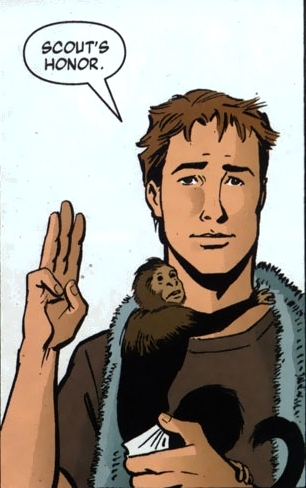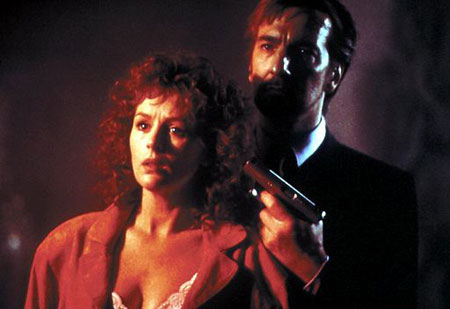Die Hard (1988) presents itself as a movie sympathetic to feminism. The protagonist, John McClane (Bruce Willis), is estranged from his wife, Holly (Bonnie Bedelia) essentially because she moved to Los Angeles to take a high-powered corporate job. John, a New York cop, can’t handle her success. The film takes care to show that John’s attitude is ridiculous and stupid — John’s limo driver from the airport calls him on it; Holly handily wins their big onscreen argument which John assholishly starts; and even John himself admits that he’s in the wrong (“very mature, John,” he mutters out loud to himself after Holly stomps out the door.) Throughout the film, Holly is shown to be a competent and successful manager, and it is never suggested that she should, or will, give up her career for her husband.
Moreover, Die Hard goes out of its way to ridicule and reject machismo. During the terrorist/hostage standoff that takes up most of the film, the cops and FBI continually act like impulsive dicks — much the way, in fact, we first see John acting in his argument with Holly. The cops and feds all are much more interested in being, as John terms them, “macho assholes” — swaggering around at the top of the pecking order, impressing their male compadres, and kicking terrorist butt. The parodically homosocial FBI agents Agent Johnson and Agent Johnson let out adolescent yawps as they fly around in their helicopter, boasting to each other how they can “live with” 25% hostage casualties. Their cockiness is presented as both idiocy and sin, and the film gleefully executes them for it. McClane survives precisely because he’s more cautious and more intelligent; a feminized action-hero who constantly exhorts himself to “think! think!” before unleashing the inevitable uber-violence.
But despite the critique of traditional action-hero masculinity, Die Hard is in the end extremely ambivalent about the idea of autonomous women. Holly wins the argument with John — but the result of that victory is not that John acquiesces. Instead, the result is that Holly and all her coworkers are immediately captured and held hostage, allowing John to cast aside the role of idiotic, defeated husband, and adopt the much more congenial and testosterone-fueled persona of heroic savior.
Coincidentally, as the plot unfolds, all those against whom John might be presumed to harbor a grudge are systematically and efficiently punished. Holly’s coworkers, of course, are all terrorized. More particularly, Holly’s Japanese boss Mr. Takagi — a fatherly executive whose warmth, manners, and calm all contrast painfully with McClane’s bad temper and working-class manners — is shot through the head by the terrorists. Later, a slick coke-snorting dealmaker who had earlier hit on Holly is similarly dispatched. The terrorists are then, not so much John’s enemies as they are his avatars — the catspaws which eliminate the other men in Holly’s life so that McClane can sweep her off to renewed bliss at the end of the film.
 In the way that its feminist trappings concealing male apocalyptic fantasies, Die Hard reminded me strongly of Brian K. Vaughn and Pia Guerra’s “Y: The Last Man.” In that series, too, a relationship crisis (in this case Yorick’s breakup with his girlfriend) is interrupted by unexpected violence which eliminates potential rivals (in this case a sudden disease which kills *all* rivals, as all men on earth but Yorick keel over.) And, like Die Hard, “Y: The Last Man” presents itself as feminist while actually treating the egalitarian relationships, with the concomitant possibility of rejection, as an occasion for anxious and protracted male posturing of a very familiar kind.
In the way that its feminist trappings concealing male apocalyptic fantasies, Die Hard reminded me strongly of Brian K. Vaughn and Pia Guerra’s “Y: The Last Man.” In that series, too, a relationship crisis (in this case Yorick’s breakup with his girlfriend) is interrupted by unexpected violence which eliminates potential rivals (in this case a sudden disease which kills *all* rivals, as all men on earth but Yorick keel over.) And, like Die Hard, “Y: The Last Man” presents itself as feminist while actually treating the egalitarian relationships, with the concomitant possibility of rejection, as an occasion for anxious and protracted male posturing of a very familiar kind.
I go back and forth on whether I prefer Die Hard or Y. On the one hand, Y is clearly a lot smarter about gender politics; on the other hand, I find the straightforward male violence of Die Hard a good bit less off-putting than the SNAG self-pity that permeates Y, especially at the end. In either case, though, I think the parallels between them are pretty telling. Men, it seems, in different mediums and over several decades, have a tendency to turn feminism into a male growth experience. With guns. Or, in other words, don’t trust the patriarchs, even when they say they love you.

